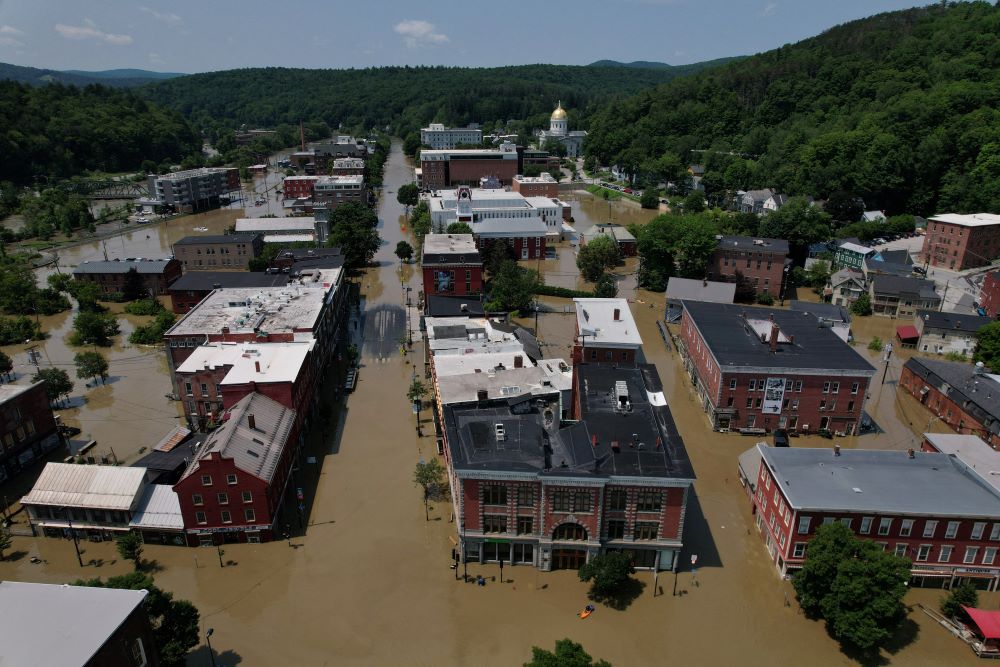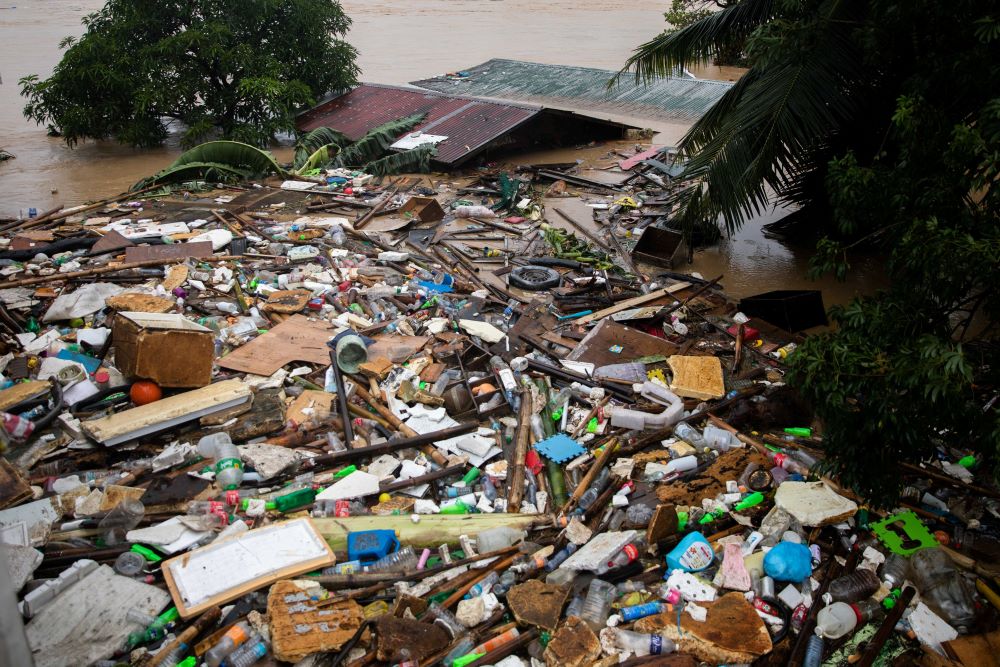
Flooded streets are seen in downtown Montpelier, Vermont, July 11. Severe storms July 9-10 dumped heavy rainfall at intense rates over parts of the Northeast, forcing road closures, water rescues and urgent warnings about life-threatening flash floods. (OSV News/Reuters/Brian Snyder)
"It may be impossible to seriously consider the reality of climate change for longer than ninety seconds without feeling depressed, angry, guilty, grief-stricken, or simply insane," wrote Jia Tolentino in a recent issue of The New Yorker. She interviewed people who had entered therapy to deal with the anxiety they felt at the reality of climate change, an anxiety that may be debilitating personally but accurately corresponds to the enormity of the problem.
Natasha Tanjutco, who became a climate activist in her teens in Manila, Philippines, spoke with Tolentino about the way Westerners look for a "linear course of action," that they try "to figure out how to feel, then figure out how to act, then act. But here, we just act, and we feel things during, we feel things after, and then we act again." Her comment, which came after a harrowing account of the night Typhoon Ulysses came ashore in November 2020, captured the complex intersection of natural and human ecologies that shape discussions about climate change and how to confront it.
None of this should surprise us Catholics. In 2015, Pope Francis surveyed the scientific literature in his groundbreaking encyclical Laudato Si'. There was no real doubt about the science of climate change then, and still less is there any doubt today, despite the repeated efforts by fossil fuel industries, and the well-funded political organizations they created, to spread doubt where none existed.
Last week, it was impossible to escape climate related news, all of it horrible. From the torrential rains and flooding in Vermont to the heat wave that hit Phoenix with record-breaking temperatures and caused the deaths of 10 people in Laredo, Texas, the evidence that we humans have begun to reap the climate whirlwind abounded. Climate variations now run to the extremes. Summer rains become downpours and high temperatures become heatwaves. Just wait until the autumn when hurricanes will be stronger because ocean temperatures are "downright shocking" according to a recent analysis of the waters around Florida.

Debris is pictured amid submerged homes near Manila, Philippines, Nov. 12, 2020, following Typhoon Ulysses. Officials at the time said nearly 200,000 people had been evacuated, some forcibly, from vulnerable coastal and low-lying areas. (CNS/Reuters/Eloisa Lopez)
Which brings us back to the issue of despair. As Tolentino wrote, it may be impossible not to let all this bad news paralyze us, drown us in despair. Against such enormous forces of nature, recycling and composting don't seem to make a dent. Indeed, I am convinced that among the principal reasons the U.S. bishops have done so little about implementing Laudato Si' is that the bishops felt powerless in the face of the apocalyptic lectures to which they were exposed in the first few years after the encyclical was rolled out. Yes, some bought into the denialism Fox News and the fossil fuel industry peddle regularly. But many just felt overwhelmed.
This problem of paralyzing despair is a tricky one. Recently, former President Barack Obama gave an interview to Hasan Minhaj, in which he discussed the advice he imparted to his daughter Malia, who had told him her friends were so discouraged at the enormity of the problem they felt crippled in their powerlessness, that "the world is burning and there is nothing I can do."
Obama's reply — and the rest of the interview, too — displayed his Augustinian sensibilities. "We may not be able to cap temperature rise to 2 degrees centigrade," the former president said. "But here's the thing. If we work really hard, we may be able to cap it at 2½ instead of 3, or 3 instead of 3½. That extra centigrade, that might mean the difference between whether Bangladesh is under water."
Advertisement
I would be more sympathetic to the former president's explanation if he had not fallen into a different, and potentially fatal, trap when serving in office: prevarication. One of his signature achievements, the Paris Agreement, set ambitious goals — ambitious and distant. Meeting them depends on a variety of factors and many countries are not credible — their efforts are nowhere close to achieving the targets they set, according to a report from the Brookings Institution. "Looking at policies instead of promises shows that global climate targets may be missed by a large margin," according to another recent study.
Goals are important and, as the Brookings study notes, countries in Europe that have set ambitious goals are also those most likely to meet them. Europe, however, is not as averse to collective effort as we Americans. In addition to setting big goals, we need to help people start. Start small. Start big. But start. A small task achieved is worth two pledges on paper.
Despair and denial cannot be allowed to stifle us. The ecology of the human spirit must be attended to and harnessed if the ecology of the planet is to be defended in time to avert even greater catastrophes than those we are witnessing today.








